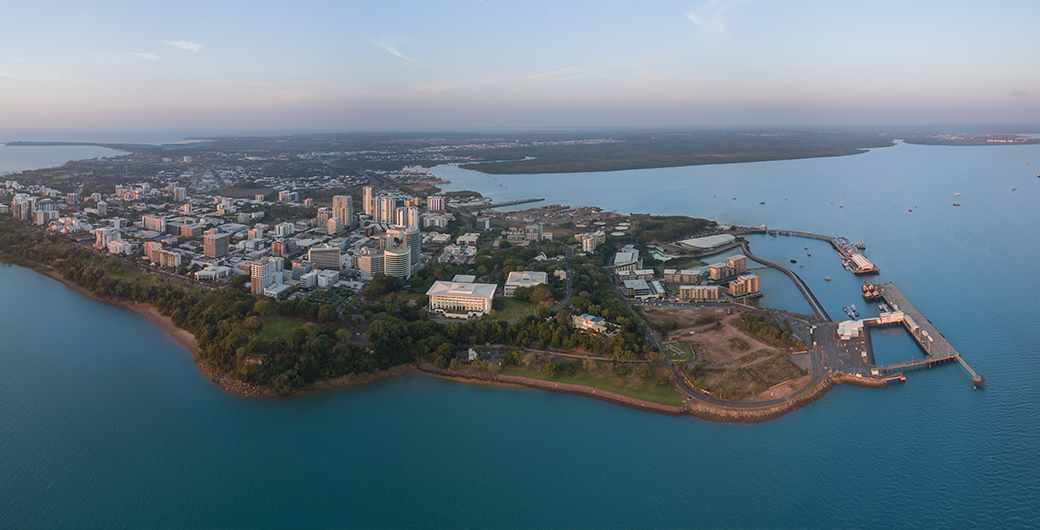Unique challenges, unique opportunities for senior Northern Territory public servant Jean Doherty
13 September 2021
● News and media

The Northern Territory is a unique jurisdiction, shaped by its rich first nations cultures and languages, vast remote landscape and diverse, dispersed population. With the uniqueness comes opportunity, but also its own mix of issues and policy challenges.
The NT has stayed largely COVID-free, protecting its vulnerable Aboriginal populations and keeping its economy going, and ANZSOG Executive Master of Public (EMPA) alum Jean Doherty (above) has played a key role in the NT’s contribution to the National Cabinet process, as well as its own approach to the unique issues COVID has posed.
Ms Doherty is the Executive Director, Intergovernmental and Legal Policy, in the Department of the Chief Minister and Cabinet, Northern Territory Government, with a key role in policy and the jurisdiction’s negotiations with the Commonwealth. As well as being an EMPA alumni she is a new representative on the ANZSOG Alumni Advisory Council.
She says the EMPA gave her a valuable set of skills, and helped her become a more adaptive leader, able to respond to the ongoing turbulence caused by the pandemic.
Ms Doherty began her career as an entry-level public servant, working part-time while she studied and worked her way up through the NT’s government structure with experience in community justice and strategic policy areas.
“I really love the roles that I’ve had and I’ve gained an understanding of how broad the public service is and how diverse its role is,” she said.
She is passionate about the challenges posed by the Northern Territory’s unique demographics and geography, as well as the opportunities.
“We often start conversations with people from other jurisdictions with ‘the Territory is different’, so what do we mean by that?” she said.
“Well, we have 240,000 people living in a huge geographical area. Around 30% of Territorians are Indigenous and 80% of the Territory’s Indigenous population are living in regional and remote areas, so we have workforce challenges and challenges of delivering services, and COVID has magnified all of those challenges. We also have a very young population – the median age is 33 versus 38 nationally.”
“The other unique factor is that 48% of the NT’s land and 85% of its coastline is subject to Aboriginal Land Rights legislation, i.e where Land Rights have been granted or are in the process of being sought to be granted.
“That means developing in this landscape is a difficult challenge with the legislative frameworks we have to negotiate, but it’s also a big opportunity because we’ve got an abundance of economic investment and major project opportunities, and the chance to work in partnership with Aboriginal communities to deliver positive and sustainable economic and social outcomes for all Territorians. The question is how do we enable this?”
The NT’s response to COVID-19
COVID-19 has exposed many of the strengths of the state and territory governments, as they have been able to tailor policies to their unique conditions, and use the National Cabinet as a co-ordinating body.
Ms Doherty said that the National Cabinet process has worked well, even with unusually short turnarounds for policy development.
“In the COAG era you had around two meetings per year, with a structured process of developing positions. That approach is now out the window. There’s less time to work through the decisions that you are advising on – we are doing a lot of ‘deep dives and policy huddles and as our Chief Minister has said, we are building the plane as we are flying it – we just can’t take the time we used to in working things through in a traditional way given we need to act quickly and decisively to protect ourselves from COVID-19 and really engage with risk.”
“For the NT, COVID highlighted how dependent communities are on the FIFO, and mobile workforce to deliver services in communities. One role we had was developing essential worker permits for 9500 people to keep communities up and running safely. In the future, building the local workforce capacity of communities will be even more important to achieve resilience.
“We have been able to shift staff from their regular roles in the public service to frontline COVID work and that agility has been a really successful model. People are thinking less that they are there to do a specific job and more there to serve the public.
“We have had to work long hours to do things quickly, but you never know what people are capable of until you give them the capability to shine. For example the ICT stuff that has come out is really incredible, projects that took 6-12 months are being done in 2-3 weeks through a big surge of staff with the right skills working on these issues.”
She said one of the challenges from this would be ensuring that the public service was able to embed the positives from its COVID response into its day-to-day work.
“We have had discussions as we went along about what we are doing and we have learnt a lot from that. There have been a lot of lessons learned at the operational level, and we are continuing to work through reflections at the strategic level to ensure that we don’t lose the good stuff and innovative practices we have learned through our COVID-19 response, such as delivering Telehealth services in regional and remote settings.”
EMPA helps leadership reflection
Ms Doherty completed her EMPA in 2014, and says the knowledge she gained was still relevant and used daily in her work.
“One of the most impressive parts of the EMPA was the quality of the teachers and the diversity of experience and knowledge that they had, as well as creating those peer networks from different portfolios and jurisdictions,” she said.
“We did a lot of work on different leadership styles, and the importance of adaptive leadership and responding in a way that meets the demands of the situation. One day you might need to be a process-focused bureaucrat, the next day an empathetic people manager, and then a collaborative leader who brings different views and people together. All that has been useful during COVID.
“The EMPA gave me the tools to reflect on, and take ownership of my own style and to say ‘I’m not that kind of leader, but I am this kind of leader’ and recognise that there are different styles and no right or wrong way to lead, and that leadership is a journey of discovery.”
Ms Doherty said she wanted to bring the Northern Territory’s perspective into the Alumni Advisory Council.
“ANZSOG is doing great work with flexible delivery, and I want to make sure that continues and that the activities and offerings recognise what the needs are in the Territory,” she said.
“As an example, things like doing a cost-benefit analysis are much more difficult to apply in the NT because of the smaller numbers, and because many of the benefits of infrastructure investment, particularly in remote, are social or they provide enabling infrastructure for larger projects, and it is tough for us to compete for infrastructure funding because of this.”
She said that apart from the COVID response her most satisfying work had been in the negotiations between the NT and the Commonwealth on the National Disability Insurance Scheme (NDIS) which had required the recognition of the unique needs of Aboriginal communities, and the ‘thin markets’ of disability service providers in the NT.
“We worked on a lot of issues around how we risk manage and how we protect the most vulnerable people in the community,” she said.
“We are now seeing the NDIS delivering in the NT, and some of the unique and innovative market approaches, such as joined up Aboriginal-controlled services delivering NDIS supports ‘on the ground’ in communities.
“This is the reason I love working in government. You see how important the decisions you make are in the community. It is my sense that as public servants, we have never felt closer to the community that we serve, it’s an incredible feeling when you are delivering for the community, and you can see the outcomes every day.”
ANZSOG’s Executive Master of Public Administration (EMPA) degree produces confident, critical thinking public sector leaders with the skills required to manage complex challenges, take the next step in their careers and deliver value to the communities they serve. Find out more at the Executive Master of Public Administration page.
Find out more about ANZSOG’s Foundation Programs
Executive Master of Public Administration (EMPA)
A part-time postgraduate qualification developed and delivered by ANZSOG exclusively for high-performing public sector managers.
Executive Fellows Program (EFP)
A program that challenges senior public service executives working in the public domain to develop new leadership perspectives in a contemporary and highly interactive setting.
Towards Strategic Leadership (TSL)
A unique program that helps public service leaders develop the qualities needed to thrive in a senior executive role: a strategic outlook, political astuteness, personal resilience and the ability to reflect and learn continuously.
